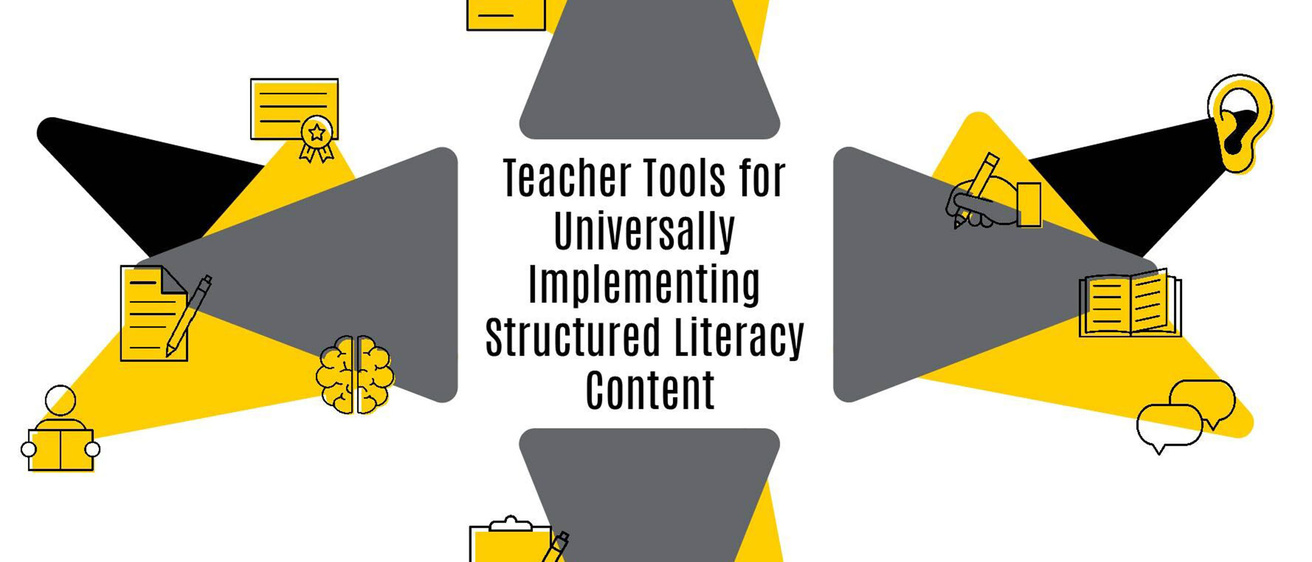In partnership with the Spencer Community School District and the Iowa Department of Education, the Iowa Reading Research Center has created a new eLearning module for educators: Teacher Tools for Universally Implementing Structured Literacy Content. This module features examples of what it means to teach in a manner that is informed by the science of reading and what some of the cornerstone elements of that instruction look like. The module provides K-12 teachers with examples of structured literacy instruction in general education classrooms as well as in Tier 2 small groups and Tier 3 intensive interventions. Importantly, this module is not specific to any particular structured literacy program or curriculum.
“There are many good programs that encompass the science of reading,” says IRRC Assistant Director of Education and Outreach Nina Lorimor-Easley, “and they will all have subtle differences.”
The aim of this module is to familiarize educators with the imperative elements of structured literacy instruction that are part of any evidence-based program. The module provides information in two areas. First, educators receive an overview of the essential components of structured literacy instruction, including synthetic and analytic thinking skills, scope and sequence, and the elements of the POSSUM acronym. Second, the module provides video examples of teachers implementing routines that demonstrate these essential elements in active classrooms.
Synthetic and Analytic Instruction
The overview of essential literacy components begins by looking at synthetic and analytic thinking skills. This section explains the difference between oral and written language, the difference between expressive and receptive language, the importance of synthetic (encoding) and analytic (decoding) language skills, and the research behind incorporating all these language skill areas into instruction.
Scope and Sequence
The scope and sequence of literacy instruction–breaking down what to teach and when to teach it–is an essential part of a curriculum aligned with the findings of the science of reading. A strong scope and sequence includes breadth and depth, allowing students to build off foundational skills toward more advanced concepts. This section defines scope and sequence, shares research supporting its use, and explains its practical applications in the classroom.
The Elements of POSSUM
The third component covered in this module is POSSUM, an acronym for phonology, orthography, syntax, semantics, understanding, and morphology. This section explains how to teach new vocabulary through each element of the POSSUM acronym. The lesson concludes with an example of each step of the process, followed by an overview of supporting research.
Skills Block and Knowledge Block Instructional Routines
The second part of the module features videos of structured literacy routines implemented in active classrooms. Demonstration videos have been categorized as either skills block or knowledge block instruction. Skills block includes sound/symbols instruction, word-level instruction, and sentence-level instruction, whereas knowledge block addresses vocabulary and comprehension instruction. Each level of instruction is shown both synthetically and analytically in general education settings, as well as in Tier 2 and Tier 3 settings when applicable. These videos provide educators with a framework for what evidence-based instruction looks like in the classroom and how it can support students’ journey with early literacy.
“Any educators or administrators who are interested in seeing instruction that is aligned with the body of work that is the science of reading would benefit from taking the module,” says Lorimor-Easley. “Regardless if they are just curious, considering a change in their own practices, or looking for affirmation of what they are doing, there is something here for everyone.”
This learning opportunity is entirely virtual and asynchronous. Enrollment is free for educators in the state of Iowa and $30 for out-of-state educators. Those interested in taking the module can visit the IRRC’s eLearning registration page.
The implementation of structured literacy routines in the classroom takes time, energy, and collaboration. The Teacher Tools for Universally Implementing Structured Literacy Content module is a great place to start exploring evidence-based literacy instruction. With this eLearning module, the IRRC aims to provide K-12 educators with the tools needed to implement consistent, cumulative, and explicit literacy instruction in the classroom.
